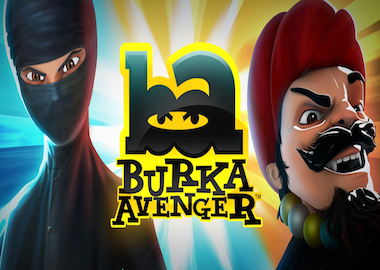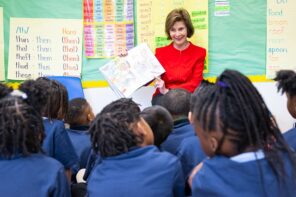While the new Pakistani cartoon “Burka Avenger” has gained media attention due to its combination of Islamic veiling—often perceived as sexist—with overt promotion of gender equality, the show’s most insightful statement may be about change in education.
The program follows the adventures of Jiya, a schoolteacher who responds to challenges by transforming into a burka-clad superheroine. As the titular alter ego, she uses pens and books as weapons to fight Islamic fundamentalists who want to close a school for girls. The cartoon is being lauded as a form of resistance to the Pakistani Taliban’s repressive standards on education for women.
Gender equality in education has been a flashpoint in Pakistan for years. While literacy has risen steadily, the rate was still only 54.9% nationally by 2009, with just 52% of students reaching grade five. Unsurprisingly, girls have been disproportionately effected, partly because of Pakistani Jihadists’ staunch opposition to female education, typified by the Taliban shooting of teenage education activist Malala Yousafzai.
But the big picture masks significant regional variation. In the Northwestern Frontier Province, where literacy is 50%, only half as many girls as boys attend primary school; by secondary school, five of every six students are male. In Sindh province, on the other hand, female enrollment is actually higher than male enrollment in both primary and secondary schools—for every three boys there are four girls.
At first glance, lack of education parity appears to correlate with hardline religious allegiances. The impoverished Northwest Frontier, a long-standing hotbed of Islamic fundamentalist organizing, has endured the majority of Taliban-related conflict, while Sindh province has seen little of the violence. From this perspective a burka-clad, equality-minded schoolteacher could signify a potent political act—the burka as a Trojan horse of equality promotion, or reclamation of Muslim identity from the Taliban’s distortions.
No such potent pattern is likely to exist, however, as the connection between education and Islamism is complex. Punjab province, the wealthiest in Pakistan, reports near-perfect gender parity in primary and secondary schooling—and it happens to be the other province where the Taliban has boomed.
In fact, burkas and repressive Islamism are not that closely connected. Sahar Yameen, a 29-year-old Hyderabad woman now living in Karachi, says the burka has taken root in Sindh province as educational equality has improved: “A decade ago young girls didn’t like to wear burka…. Nowadays I see young girls/college girls wear this willingly with most modern styles. I think they want to be moderate Muslims. Girls are getting education, moving in society, but… they feel in it safer.”
This appears contradictory, perhaps, to the Western view of the burka as oppressive and backward. But Yameen agrees with religious scholar Karen Armstrong, who has called Islamic veiling a reaction to swift installation of Western standards in non-Western societies. In her 2000 book The Battle for God, she identified burkas as “a tacit critique of the darker side of the modern spirit” and a way for Muslim women to maintain their identity while transitioning from rural traditions to industrialized urban living.
“Burka Avenger,” in other words, may do more to encourage the large majority of Pakistanis already enjoying relatively strong education than to convince uneducated people of the value of schooling. Indeed, wealthier people may find it easier to see the show at all as they’re more likely to own a TV.
Then again, a 2007 economics study (PDF) documented an upswing in gender equality and education in India after the arrival of cable television. “Introducing cable increases the likelihood of current enrollment for girls by 3.5 percentage points,” the authors wrote, describing a shift over four times larger than the 0.83% increase created by the Pakistani government between 2005 and 2011.
The show could have the same effect in Pakistan, particularly if public interest stays strong. (The creators, Unicorn Black Productions, have said on Facebook, “We are blown away by the overwhelming response.”) By promoting middle-class values to the Pakistanis who do see the show, “Burka Avenger” might make the show’s tagline a real promise to Pakistan’s Islamist minority: “Don’t mess with the lady in black.”
In any case, the English-subtitled first episode below shows that it sure beats the heck out of Disney.





